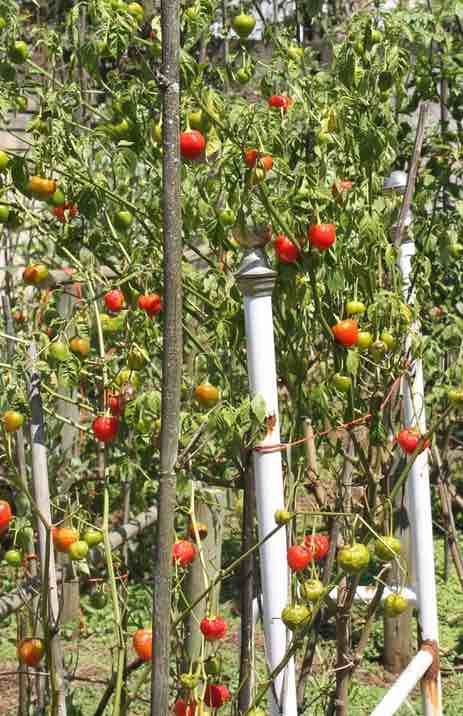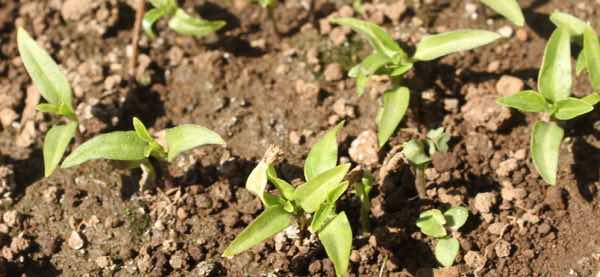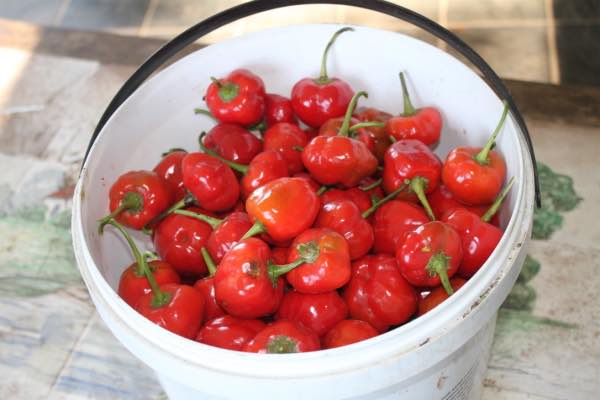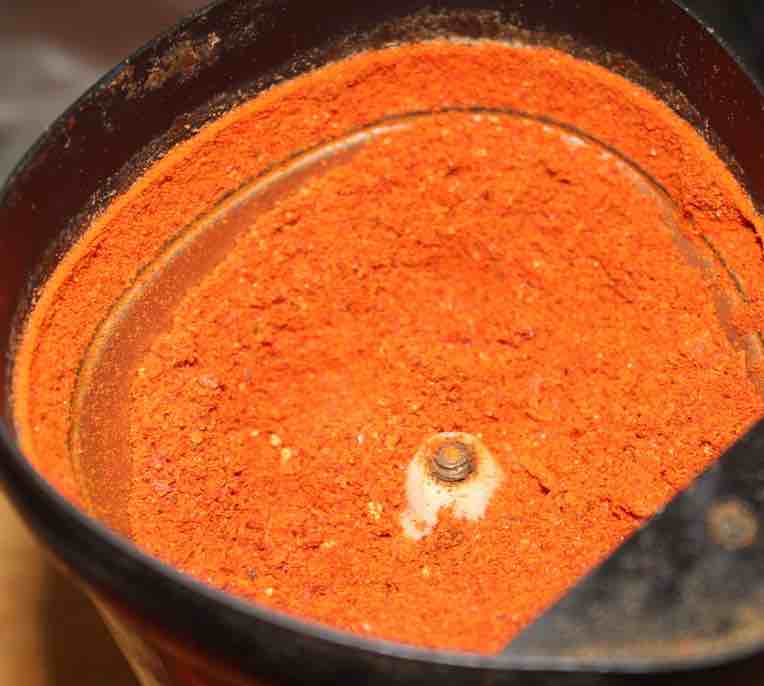- Homepage
- Our green home
- Peppadew Cottage Industry
Peppadew cottage industry
A peppadew cottage industry is only for those who love fresh spices and have no aversion to, hat on head working out in the midday-sun and pottering in the kitchen.
Our family has a long history going back more than 20 years with peppadews; they are a chilli with all the marvellous flavour of hot-capsicum but much less of the heat.
Generally sweet paprikas tend to be a bit anaemic and chillis are red hot; they burn your tongue, stomach and tomorrow your rear-end. But peppadews are a wonderful compromise; lots of the piquant flavour but little of the terror and plenty of capsaicin, the magic ingredient.

They are for me the queen of the peppers but I never see them for sale. If you are looking for a small challenge why not consider taking the gap? There is money to be made by the entrepreneur and they are easy to grow. They thrive on compost, manure and worm-wee. No toxic chemical sprays are needed and we have little trouble from pests.
There are at least six-ways to make money out of peppadews.
Sell them as fresh fruit
Selling them as fresh fruit will command a price at least as good as sweet-peppers and I would suggest with careful marketing a good deal more. Organic food has greater value; it is worth a little extra.
Preserving peppadews
Preserving peppadews is so easy. The good-wife does it all the time; vinegar and a little sugar.
Freezing peppadews
Freezing peppadews is certainly my first choice out of season; it’s the least schlepp. We have a six-months supply waiting to be enjoyed.
Dried peppadews
Dry your peppadews and turn them into flakes or a powder. I do this but it is does take 20-odd hours in the drier; have you got free solar electricity?
Sell the seeds
There's a market for peppadew seeds. Spread them out on newspaper to dry; there are hundreds in each pod.
Sell the seedlings

There is certainly a market for your peppadew seedlings.
Stuffed peppadews
We have friends who stuff their peppadews with feta cheese and other fillings. They bottle them and export them at great profit.

Peppadews are one of my absolute favourite foods. We eat them virtually every day throughout the seasons. From late summer right through autumn for about five months we enjoy them raw on our salads and gently fried in butter in Eggs-Hilton. For the rest of the year they are consumed either pickled, frozen or as dried flakes.
This peppadew sauce is a new addition to our armamentarium; it's fermented to give extra flavour and reduce the influence of so-called antinutrients. It is a natural probiotic.
Lock-down has meant time to experiment;
we have been drying them and producing a peppery powder that is without
equal. I never realised how much flavour is lost from oxidation in the
spices one purchases in the grocery store. Sprinkled on Eggs Florentine or into
freshly made hummus it’s a treat.
After citrus they are the
second richest source of vitamin-C, one of the four important nutrients that help prevent frailty syndrome; and not inconsequentially at this time virus attacks.
They are rich in a phytochemical called capsaicin that is a powerful natural anti-inflammatory agent; and they turn an otherwise rather dull lettuce salad or dinner into a delight. What more could one want?
Each plant takes up about a square metre and would give you at least 100 fruit. They do need to be staked as the peppers are very heavy; otherwise they do not ripen properly and will not turn bright-red. They continue to bear for several seasons but the yield drops after the second year.
We have perhaps 20 plants at our green home; they provide a
riot of colour and wonderful nutrition.
Perhaps the most tiresome part is cutting the fruit open and removing the seeds prior to processing; it is time-consuming.
The seeds can be very hot. That is where much of the capsaicin is to be found though; getting a steady supply of anti-inflammatory substances from our food is what reduces the anger in our muscles and joints.
So we only remove the seeds from about half the peppadews. An apple-corer will make your life easier.
The bucket shown contains nearly 2 kilogrammes and about 150 of the fruit. At a local supermarket ordinary peppers sell for over R60/kg. A quick calculation gives them a retail value of nearly a million rand per hectare.
There is money to be made from a cottage industry of peppadews; but only for those not afraid of the midday sun and have no desire to spend their lives sitting behind a computer. Selling them at a farmers’ market or REKO should be a breeze.
Growing peppadews has been a lot of fun; the taste of your own freshly-made spice is to die for.
Gochugaru
Gochugaru is the name given by Koreans to chili flakes. Halve and destalk the peppers; then dry them in a cool oven for a whole day with the fan switched on.
Divide them into threes; one with no seeds, another with some and the third with all of them.
Grind them and store in sealed-bags in the freezer.
We use gochugaru in making kimchi and sauerkraut.

Peppadew cottage industry
Peppadew cottage industry could make you a few bob on the side.
When browsing use right click and "Open Link in New Tab" or you may get a bad gateway signal.
What does a peppadew taste like?
A peppadew is a unique mixture of sweet and spicy; they can be quite hot occasionally, particularly if your neighbour is growing Trinidad Scorpions! Fruity might describe them well.
The material expressed on this page is gleaned from the nutritional and environmental literature; it is clearly referenced. A plain distinction is made between the author's opinion and that which is scientifically proven. When in doubt consult your health professional.
To suggest a correction or clarification, write to Dr Bernard Preston here. Contact.
Are peppadews South African?
These piquant peppadews were first branded in South Africa but all chilies come originally from Central America. They are rich in flavour but generally have no sting in the tail; occasionally you may find one that will burn.
They are easy to grow so we are turning them into a peppadew cottage industry. Should you find yourself out of tune with the world, there's always the garden
Newsletter
Our newsletter is entitled "create a cyan zone" at your home, preserving both yourself and Mother Earth for future generations; and the family too, of course. We promise not to spam you with daily emails promoting various products. You may get an occasional nudge to buy one of my books.
Here are the back issues.
- Lifestyle and ideal body weight
- What are ultra-processed foods?
- Investing in long-term health
- Diseases from plastic exposure
- Intensive lifestyle management for obesity has limited value
- A world largely devoid of Parkinson's Disease
- The impact of friendly bacteria in the tum on the prevention of cancer
- There's a hole in the bucket
- Everyone is talking about weight loss drugs
- Pull the sweet tooth
- If you suffer from heartburn plant a susu
- Refined maize meal and stunting
- Should agriculture and industry get priority for water and electricity?
- Nature is calling
- Mill your own flour
- Bake your own sourdough bread
- Microplastics from our water
- Alternative types of water storage
- Wear your clothes out
- Comfort foods
- Create a bee-friendly environment
- Go to bed slightly hungry
- Keep bees
- Blue zone folk are religious
- Reduce plastic waste
- Family is important
- What can go in compost?
- Grow broad beans for longevity
- Harvest and store sunshine
- Blue zone exercise
- Harvest and store your rainwater
- Create a cyan zone at your home
Did you find this page interesting? How about forwarding it to a friendly book or food junkie? Better still, a social media tick would help.
- Homepage
- Our green home
- Peppadew Cottage Industry
Address:
56 Groenekloof Rd,
Hilton, KZN
South Africa
Website:
https://www.bernard-preston.com